Clean your iPhone speakers
Clean your iPhone speakers
How to Clean Your iPhone Speakers: The Do’s and Don’ts

No matter how fastidious you think you are with your smartphone cleanliness routine, over time your iPhone’s speakers will slowly get filled up with dust, dirt, and other disgusting debris. This can result in your iPhone’s speakers sounding distorted and muffled, whether for media playback or during phone calls. But fear not! We’re here to guide you through the “do’s” and “don’ts” of how to get your iPhone speakers back to their factory fresh state.
Check to Make Sure Your iPhone Speakers are Working
Before we dive into the cleaning process, it’s good to ensure that your iPhone speakers are indeed the cause of the issue. If you’re not sure whether your iPhone speakers are working correctly, there is a super-quick way to check. Simply play a piece of audio, such as a song or video, and listen for the sound. If you don’t hear any sound, or if your speaker button on the “Ringer and Alerts” slider is dimmed, then your speaker may need servicing, and it’s best to get in touch with Apple for assistance.
The ‘Don’ts’ of Cleaning Your iPhone Speakers
Now that you’re ready to clean your iPhone speakers, it’s essential to know what not to do. There are certain things you absolutely should not attempt when cleaning your speakers.
- Don’t use any sharp objects to try to gouge out any gunk. We’ve seen advice suggesting that you should use the sharp end of toothpicks, tweezers, and even paperclips to scrape your speaker grilles. But this is a big no-no. Using sharp objects can easily damage your expensive smartphone and potentially void your warranty.
- Don’t use rubbing alcohol or any kind of liquid. While rubbing alcohol may seem like a good option for cleaning, it’s not recommended for your iPhone speakers. Liquids and the inner workings of iPhones don’t mix well. Moisture can seep into the device and cause damage that is costly to repair.
- Don’t use canned, compressed air. These products are useful for cleaning robust electronics, such as laptop keyboards, but the force produced is too strong to be used on more delicate electronics like your iPhone. Using canned air can potentially push the dirt further into the device, exacerbating the problem.
What’s Apple’s Official Advice?
When it comes to cleaning your iPhone’s speakers, it’s always helpful to refer to Apple’s official advice since they manufacture the devices. According to Apple, “If necessary, clean the speaker or receiver opening with a small, soft-bristled brush. Make sure that the brush is clean and dry.” So, let’s take a cue from Apple and go a step further with our “do’s” of cleaning your iPhone’s speakers.
The ‘Do’s’ of Cleaning Your iPhone Speakers
Now that we have covered what not to do, let’s focus on the right way to clean your iPhone speakers.
- Alienware gaming PC with RTX 3070 is $1230 off today.
- Major AI chatbots face new attack with unknown solution
- Top Noise-Canceling Headphones 2023
-
Use a small, soft-bristled brush: Following Apple’s advice, gently brush the speaker grilles with a small, soft-bristled brush. This will help remove any accumulated dust or debris without risking damage to your device.
-
Ensure the brush is clean and dry: It’s crucial to use a clean and dry brush to avoid introducing any additional dirt or moisture to your iPhone. Any residue or liquid can potentially harm the speaker components, so keep the brush as clean and dry as possible.
-
Be gentle: When using the brush, make sure to be gentle and avoid applying excessive force. Applying too much pressure can also damage the delicate components of your iPhone speakers.
-
Repeat the process as necessary: If there is still residue or dirt left after the first attempt, continue brushing gently until the speakers are clean. It may take a few tries to completely remove all the debris.
By following these do’s and don’ts, you can effectively clean your iPhone’s speakers without causing any harm. Enjoy crystal-clear audio during playback and phone calls, and keep your device in optimal condition.
Now, isn’t that better?
This post was originally published in June 2021 and was updated in July 2022.






